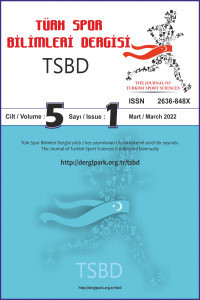Eğitim Fakültesi Öğrencilerinin Merhamet Düzeylerinin Spor ve Farklı Değişkenler Açısından İncelenmesi
Bu araştırma, 2017-2018 öğretim yılında, Atatürk Üniversitesi, Kazım Karabekir Eğitim Fakültesi’nin Beden Eğitimi ve Spor Öğretmenliği ile Okul Öncesi bölümlerinde öğrenim gören öğrencilerin merhamet düzeylerinin spor ve farklı değişkenler açısından incelenmesi amacıyla yapılmıştır. Araştırmaya 156 kadın, 136 erkek olmak üzere toplamda 292 öğrenci katılmıştır. Araştırmada Kişisel Bilgi Formu (KBF) ve Pommier (2011) tarafından geliştirilen, Akdeniz ve Deniz (2016) tarafından Türkçe ‘ye uyarlanan 24 ifadeden oluşan Merhamet Ölçeği kullanılmıştır. Veriler analiz edilirken; demografik özelliklerin belirlenmesinde betimsel istatistik, iki bağımsız değişken ile merhamet ölçeği arasındaki farkı incelemek için Bağımsız Örneklem T Testi, ikiden fazla değişken ile merhamet düzeyleri arasındaki farkı incelemek için ise Tek Yönlü Varyans Analizi (Anova) testleri kullanılmıştır. Değişkenler arasındaki fark P<0.05 anlamlılık düzeyi esas alınarak yorumlanmıştır. Sonuç olarak; öğrencilerin merhamet düzeyleri ile cinsiyet ve spor yapma durumu değişkenleri arasında istatistiksel olarak anlamlı farklılık bulunmuştur. Fakat bölüm, spor türü, haftalık spor yapma süresi ve spor yapma amacı değişkenleri arasında ise anlamlı bir farklılık bulunmamıştır. Öneri olarak, çocukların gelişiminde önemli bir etkiye sahip olan öğretmenlerin öğrencilerle olan ilişkilerinde merhametli olmaları çocukların gelişimi açısından önemli olabileceği düşüncesinden yola çıkarak, öğretmenlerin merhamet düzeyleri üzerinde olumlu etkiye sahip olacak değişkenlerin belirlenmesi önem arz etmektedir.
The Investigation of Compassion Levels of Education Faculty Students in Terms of Sport and Different Variables
This study was carried out to investigate the compassion levels of the students attending the Physical Education and Sports Teaching and Preschool departments of Kazım Karabekir Education Faculty in Atatürk University in 2017-2018 academic year in terms of sports and different variables. A total of 292 students (156 females and 136 males) participated in the study. In the study, the Personal Information Form (KBF) and the Mercy Scale consisting of 24 statements developed by Pommier (2011) and adapted to Turkish by Akdeniz and Deniz (2016) were used. While analyzing the data; Descriptive statistics were used to determine demographic characteristics, Independent Sample T Test was used to examine the difference between two independent variables and comoassion scale, and One-Way Variance Analysis (Anova) tests were used to examine the difference between more than two variables and compassion levels. The difference between the variables was interpreted based on the significance level of P <0.05. As a result; There was a statistically significant difference between the compassion levels of the students and the variables of gender and sporting status. However, no significant difference was found between the variables of department, type of sport, duration of weekly sport and purpose of sport. As a suggestion, it is important to determine the variables that will have a positive effect on the compassion levels of the teachers, considering the fact that the teachers who have a significant effect on the development of children are compassionate in their relationship with the students and may be important for the development of the children.
Keywords:
Compassion, students, sport,
___
- Akdeniz, S. ve Deniz, M. E. (2016). Merhamet Ölçeği’nin Türkçeye uyarlanması: Geçerlik ve güvenirlik çalışması. The Journal of Happiness & Well-Being, 4(1), 50-61.
- Baltacıoğlu, İ. H. (1995). Talim ve Terbiye'de İnkılâp (1. Baskı). İçinde: Rıdvan Canım ve Remzi Yavaş Kınal (Haz.), İstanbul: MEB.
- Beresford, A. (2016). The Compassionate Mind: A Correlational Investigation Into The Relationship Between Self-Compassion and Compassion For Others. Unpublished PhD thesis, Manchester Metropolitan University.
- Beutel, A. M. and Marini, M. M. (1995). Gender and values. American sociological review, 436-448.
- Braun, J.M. (1993). Compassion and the Psychotherapist. Unpublished PhD thesis. California Institute of Integral Studies. California.
- Cürcani, S. Ş. (1997). Tarîfât: Arapça-Türkçe Terimler Sözlüğü, Çev. Arif Erkan, İstanbul: Bahar Yayınları.
- Davidson, R. and Harrington, A. (2002). Visions of Compassion: Western Scientists and Tibetan Buddhists Examine Human Nature. New York: Oxford University Press.
- Ekstrom, L. W. (2012). Liars, medicine, and compassion. The Journal of medicine and philosophy, 37(2), 159-180.
- Germer, C. K. and Siegel, R. D. (2012). Wisdom and Compassion in Psychotherapy: Deepening Mindfulness in Clinical Practice. New York, NY: Guilford.
- Gilbert, P. (2005). Compassion and Cruelty: A Biopsychosocial Approach. In P. Gilbert (Ed), Compassion: Conceptualisations, Research And Use In Psychotherapy (9-74). London, England: Routledge.
- Kandemir, M. Y. (1993). Örneklerle İslam Ahlâkı. İstanbul: Nesil Yayınları.
- Karasar, N. (2005). Bilimsel Araştırma Yöntemi (17. Baskı). Ankara: Nobel yayın dağıtım, 81-83.
- Kıral, B. ve Başdağ, D. (2017). Sınıf öğretmenlerinin merhamet eğitimine ilişkin görüşleri. Trakya Üniversitesi Eğitim Fakültesi Dergisi, Özel Sayı, 80-96.
- Ledoux, K. (2005). Understanding compassion fatigue: understanding compassion. J Adv Nurs, 71, 2041-2050.
- Neff, K.D. (2003). The development of validation of a scale to measure self compassion. Self and Identity, 2(3).
- Nussbaum, M.C. (2001). Upheavals of Thought: The Intelligence of Emotions. Cambridge: Cambridge University Press.
- Pommier, E. A. (2011). The compassion scale. Dissertation Abstracts International Section A: Humanities and Social Sciences, 72, 1174.
- Schopenhauer, A. (2007). Merhamet. (Z. Kocatürk, Çev.). İstanbul: Dergâh Yayınları.
- Snow, N. E. (1991). Compassion. American philosophical quarterly, 28, 195-205.
- Türkiye Diyanet Vakfı İslam Ansiklopedisi, (2004). Ankara: Türkiye Diyanet Vakfı Yayın Matbaacılık ve Ticaret İşletesi, Cilt: 29.
- Underwood, L. G. (2002). The human experience of compassionate love. in Stephen G. Post, Lynn G. Underwood, Jeffrey P. Schloss, and William B. Hurlbut (Eds.), Altruism and Altruistic Love: Science, Philosophy, & Religion in Dialogue (72- 88). New York: Oxford University Press.
- Yetim, A. A. ve Göktaş, Z. (2004).Öğretmenin mesleki ve kişisel nitelikleri. Kastamonu Eğitim Dergisi, 12(2).
- ISSN: 2636-848X
- Başlangıç: 2018
- Yayıncı: Erkan Faruk ŞİRİN
Sayıdaki Diğer Makaleler
E-Spor Katılım Motivasyonu Ölçeği’nin (EKMÖ) Geçerlik ve Güvenirlik Çalışması
Cimnastikte Sürat Çeviklik ve Denge İlişkisi
Dede BAŞTURK, Zeliha ÇATALKAYA, Mehmet Emin SEYHAN, Yusuf AÇIKALIN, Korhan HONDOROĞLU, Havva KARATAŞ
Elit Türk Kadın Buz Hokeycilerin Fiziksel Profilleri
İlyas KARAKAŞ, Bereket KÖSE, Niyazi Çağrı KARABULUT
Erdoğan TOZOĞLU, Mücahit DURSUN, Bahar GÜLER
Çağatay DERECELİ, Turhan TOROS, Rabia YILDIZ
10-14 Yaş Grubu Kadın Tenis Oyuncularının Bazı Fiziksel ve Motorik Özelliklerinin İncelenmesi
Analysis of Physical Inactivity Based on Sociodemographic Criteria in Turkey
